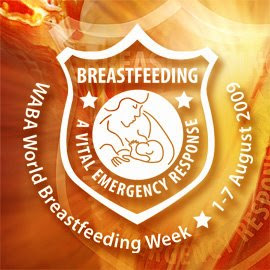
Very few know the reason that I chose the first week of August to mark the World Breastfeeding week, so I gave myself the task of seeking Innocenti Declaration, which was signed around the year 1990 and just the first week of August , for the same year after year, WABA and other organizations that support breastfeeding , commemorate and dedicate at this time.
share with you the statement and its rationale.
INNOCENTI DECLARATION
The protection, promotion and support of breastfeeding
WHO / UNICEF - 1990
Statement Innocenti was developed and approved by the participants in the joint WHO / UNICEF policy makers on "Breastfeeding in the 1990s: a global initiative, sponsored by the United States Agency for International Development (AID ) and the Swedish International Development Agency (SIDA), held at the Spedale degli lnnocenti in Florence (Italy) from July 30 to August 1, 1990. The Declaration reflects the content of the original background paper prepared for the meeting and the consensus opinions expressed in the plenary sessions.
RECOGNIZING:
that breastfeeding is a unique process:
· Provides ideal nutrition to infants and contributes to healthy growth and development.
Reduces the incidence and severity of infectious disease, reducing morbidity and mortality.
Promotes women's health by reducing the risk of breast and ovarian cancer, and to increase the interval between pregnancies.
· Provides social and economic benefits to the family and the nation.
· Provides most women a sense of satisfaction when successfully carried out.
And recent research has pinpointed:
• That these benefits increase when the infant is breastfed exclusively (without giving any other food, liquid or solid, feeding frequently and without constraints) during the first six months of life and then proceeds to an extended period breastfeeding combined with complementary feeding.
degrees and program interventions can result in positive changes in breastfeeding practices. DECLARE
THEREFORE:
That global goal for optimal health and nutrition of mothers and children, all women should be able to exclusively breastfeed their children and all infants should be exclusively breastfed from birth to six months.
Thereafter, infants should still be breastfed while receiving appropriate complementary foods in sufficient quantities, up to two years of age or older. This child-feeding ideal is to be achieved by creating an appropriate atmosphere of awareness and support for women to carry it out.
Achieving this goal requires, in many countries, reinforcing the "breastfeeding culture" and vigorously defend the "culture of the bottle." This requires commitment and support for social mobilization, maximizing the prestige and authority of acknowledged leaders of society in all its sectors.
should be made to increase women's confidence in their ability to breastfeed. Give them that confidence requires removing constraints and influences that manipulate perceptions and behavior in terms of breastfeeding, often by subtle and indirect means.
This requires sensitivity, continued vigilance and quick communication strategy and comprehensive covering all media and targeted at all levels of society. Furthermore, should remove obstacles to breastfeeding that rise in the health system, the workplace and the community.
measures must be taken to ensure that women receive adequate food to enable them to achieve optimal health for themselves and their families. In addition, all women should have access to information and services for family planning that allows them to sustain breastfeeding and avoid shortened birth intervals that threaten both their health and nutritional status and that of their children.
All governments should develop national breastfeeding policies and set appropriate national targets for the decade of 1990. Governments should establish a national system for assessing the achievement of their objectives and develop indicators such as the proportion of infants exclusively breastfed when discharged from the maternity services and the proportion of infants exclusively breastfed at four months old.
are further encouraged national authorities to integrate their breastfeeding policies with general health policies and development.
In doing so, they should reinforce all the measures that protect, promote and support breastfeeding with complementary programs such as prenatal and perinatal care, nutrition, family planning and prevention and treatment of common diseases mother and child. All health personnel should have training necessary to implement these policies on breastfeeding. OPERATIONAL GOALS
the year 1995 all governments will:
° it appointed a national breastfeeding coordinator who has the appropriate authority and established a multisectoral breastfeeding committee composed of representatives of governmental departments and associations of health professionals.
• Ensure that every facility providing maternity services fully practices all Ten Steps to Successful Breastfeeding displayed in the joint WHO / UNICEF (Geneva, 1989) entitled "Protecting, promoting and supporting breastfeeding: the special role of maternity services."
° it taken steps to implement the principles and objectives of all Articles of the International Code of Marketing of Breast-milk Substitutes and subsequent relevant resolutions of the World Health Assembly in its entirety.
° it approved imaginative legislation protecting the breastfeeding rights of working women and establishing means to implement them.
We also urge international organizations to:
· Build strategies for action to protect, promote and support breastfeeding, including monitoring and evaluation of their global strategies.
• Support the analysis and national surveys on the situation of breastfeeding and the development of goals and objectives.
• To encourage and support national authorities in the task of planning, implementing, monitoring and evaluating their breastfeeding policies. -------- Thanks for subscribing

